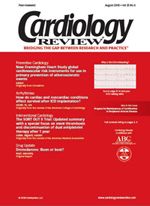Publication
Article
Cardiology Review® Online
High insulin levels and the risk of hypertension
Insulin resistance has been linked to an increased risk of hypertension, type 2 diabetes mellitus, and cardiovascular disease.
Insulin resistance has been linked to an increased risk of hypertension, type 2 diabetes mellitus, and cardiovascular disease.1 It is unclear whether insulin resistance or associated hyperinsulinemia causes hypertension. Many patients with type 2 diabetes require insulin to achieve the American Diabetes Association target of a glycosylated hemoglobin (A1C) level of < 7%, which often requires large doses of insulin (80-100 U/day) to overcome insulin resistance. Large doses of insulin are associated with hyperinsulinemia and weight gain.
P
r
P
Yki-Jarvinen and colleagues assessed 100 insulin-treated patients with type 2 diabetes who received either oral antidiabetic agents (a sulfonylurea with or without metformin hydrochloride [Fortamet, Glucophage, Riomet]) with 1 injection of neutral protamine Hagedorn (NPH) insulin or multidose regular and NPH insulin alone for 1 year.2 After 1 year, A1C levels decreased by 1.7% ± 0.2% in subjects whose baseline mean body mass index (BMI) was < 28.1 kg/m2 (nonobese) and by 0.5% ± 0.2% in those with a BMI > 28.1 kg/m2 (obese). The nonobese subjects gained less weight on combination therapy (3.5 ± 0.6 kg) vs insulin alone (5.1 ± 0.6 kg; < .05), although in obese patients, both groups had a similar weight gain (4.4 vs 4.5 kg). The insulin dose for the combination-therapy group was 0.2 U/kg and 0.6 U/kg for the insulin-alone group. Systolic blood pressure in the entire study population was 1, 6, 8, and 8 mm Hg higher at 3, 6, 9, and 12 months, respectively, than at baseline. The increase in systolic blood pressure showed a weak positive correlation with weight gain ( = 0.22; < .02).
A study by Bruno and colleagues assessed the effects of fasting plasma glucose levels, blood pressure, antidiabetic treatment, and BMI on mortality in an Italian population-based cohort with type 2 diabetes.3 There were 577 deaths, with 260 deaths caused by cardiovascular events in 1967 subjects followed up after 7 years. The most important predictors of all-cause mortality were insulin treatment (72% increase) and fasting plasma glucose levels > 160 mg/dL (30% increase). The most important predictors of mortality from cardiovascular events were insulin treatment (35% increase) and hypertension (40% increase).
Cardiology Review
In this issue of , Tseng reports the results of an observational cohort study of 87,850 Taiwanese adults with type 2 diabetes who participated in a telephone survey. Insulin treatment was associated with a 45% higher risk of developing hypertension. This study adds to the body of literature that recognizes that high levels of insulin, whether endogenous or exogenous, can increase the risk of hypertension. Insulin has been shown to be responsible for increasing renal sodium reabsorption and activating the sympathetic nervous and renin-angiotensin systems,4 which could affect blood pressure. The pathophysiology of type 2 diabetes includes insulin resistance along with decreased insulin secretion; both of these conditions need to be treated. If insulin is required to achieve glycemic targets, it should be used in combination with insulin sensitizers, particularly metformin, to limit the amount of insulin required, thus minimizing the risk of developing or worsening hypertension. Future research should evaluate which combinations of insulin and insulin sensitizers work best to control glycemia and improve insulin resistance.






